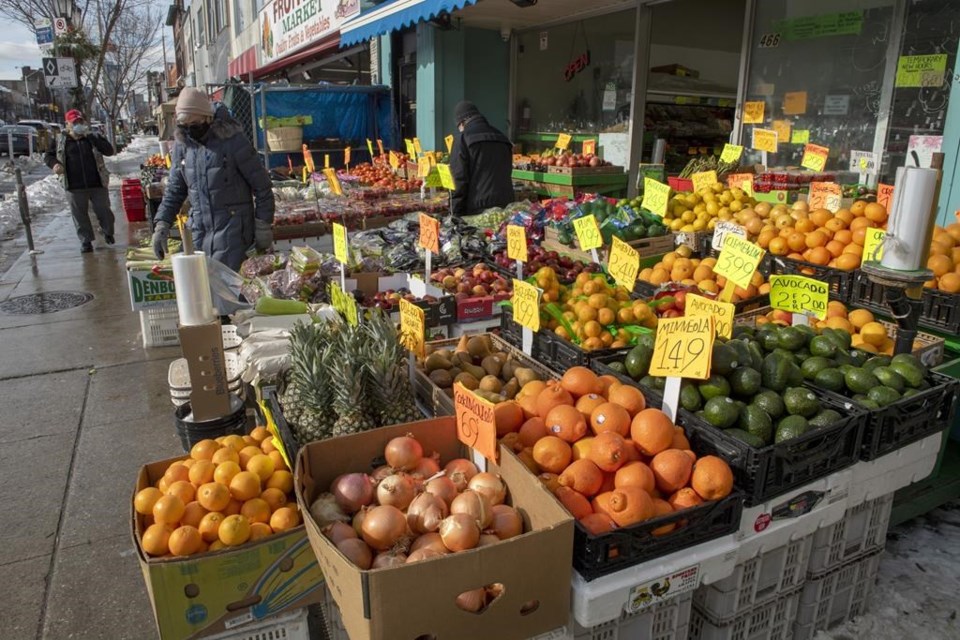TORONTO — Ontario is ramping up pandemic safety inspections on farms where thousands of migrant workers are set to arrive for the new growing season, although the labour minister wouldn't say if those employees would have access to COVID-19 vaccines.
Monte McNaughton said Wednesday that hundreds of inspectors will visit farms in the coming weeks to ensure safety measures are being followed.
"Last year, we knew farmers needed extra guidance on how to protect workers so our visits focused on education," McNaughton said. "This year, we're enforcing and issuing orders, no excuses."
More than 20,00 migrant workers -- an essential labour force for the province's food supply chain -- are set to take up jobs at Ontario farms and greenhouses in the coming weeks.
During the first wave of the pandemic, dozens of farm outbreaks were reported across the province as Ontario struggled to test and isolate workers.
More than 1,780 temporary foreign workers in Ontario tested positive for COVID-19 in 2020, and three died of the virus.
Last November, the province introduced a strategy with 35 recommendations aimed preventing farm outbreaks, protecting workers and securing the food supply chain.
Getting out to conduct farm inspections now is part of a proactive plan, McNaughton said, adding that safety checks in worker living quarters are the duty of the federal government.
"This year, we're starting early, visiting farms before the growing season even starts, and before most temporary foreign workers arrive," he said.
McNaughton would not say, however, if Ontario will provide the COVID-19 vaccine to temporary foreign workers.
"I would urge the federal government to work as hard as possible to ensure that we get enough vaccines for all the people and all the workers here in Ontario," he said when asked about the issue repeatedly.
The executive director of the Migrant Workers Alliance said the temporary foreign workers should be offered free access to the COVID-19 vaccine, but it should not be mandatory.
Syed Hussan said a public education campaign that communicates directly with workers, who may not trust the medical system, will be critical.
"We are calling for the federal and provincial governments to work together to ensure there is dignified, free access to the vaccine," he said.
Hussan also said he is concerned that bolstering farm inspections won't be enough to address many of the issues that caused farm outbreaks last year.
The province must mandate physical distancing on the job and in worker living quarters, and the federal government must empower workers by granting them permanent resident status, he said.
"As long as workers don't have permanent immigration status, inspections don't work," he said. "Workers need to have the power to say no to bad jobs."
NDP legislator Taras Natyshak, who represents a riding in Windsor-Essex where thousands of migrant workers are employed each year, said the pandemic has exposed their vulnerability.
Temporary foreign workers should have better workplace protections such as sick pay and access to the COVID-19 vaccine, he said.
"This group of workers is essential to the food security of our country," Natyshak said. "So we have to ensure that they have access to the vaccine, whether in their home country ... or access when they do arrive in Canada."
Meanwhile, Ontario's chief medical officer of health issued new guidance Wednesday to all of the province's hospital CEOs and public health units on the timeline to provide health-care workers with their second dose.
Dr. David Williams said because of shipping delays with the Pfizer-BioNTech vaccine, the province will need to extend the time between doses for the workers to between 35 days and 42 days after their first shot.
Earlier this week, the province said it was extending the time between doses for workers but did not provide a detailed window, other than to say the second dose must be administered before 42 days.
The news comes as the province shifts its vaccine allocations in a bid to immunize all long-term care, high-risk retirement, and First Nations elder care residents by Feb. 5.
The government had initially promised to complete the vaccination of all long-term care home residents, staff and caregivers by Feb. 15.
"The extended dosage interval is a direct response to the temporarily reduced vaccine availability from the federal government and uncertainty regarding the stability of supply in the near-term, as well as the current provincial epidemiology of the pandemic," Williams said in the letter Wednesday.
Ontario reported 1,670 new cases of COVID-19 on Wednesday and 49 more deaths linked to the virus.
A total of 305,330 doses of the COVID-19 vaccine have been administered in the province so far.
This report by The Canadian Press was first published Jan. 27, 2021,
Shawn Jeffords, The Canadian Press

